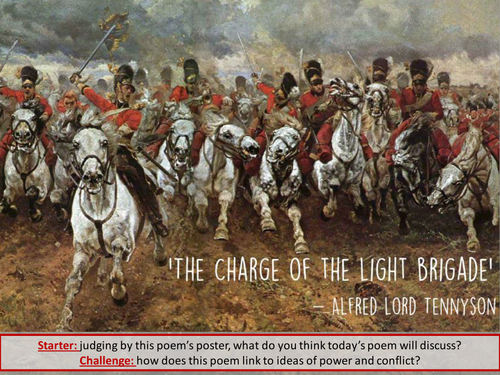




A series of three lessons analysing Lord Tennyson's 'Charge of the Light Brigade' for new spec AQA English Literature 2015 - all learning objectives are based on AQA's AOs
Lesson begins exploring the socio-historical context surrounding the poem and understanding the basic history of the Crimean War and Tennyson's motivation for writing the poem. This includes students watching numerous videos and reading from the board (all instructions are placed in the 'Notes' below each slide). Students will then be provided with the Times article which discusses the 'Battle of Balaclava'. As students write, students are invited to look at how soldiers and presented and then are required to complete a task based on this. I found that by having this secure understanding before the poem of how soldiers were glorified, students found it much easier to distinguish between Tennyson's glorifying of the soldiers and negative portrayal of war. On a slide, I have attached a student example from my class to show how my students completed this inference based task.
A large chunk of the second lesson will encourage students to be looking at purely the structure and form of the poem and there is a grid to complete for students to then stick over their poem (teacher discussion points on Notes below slide)
Next lesson: stanza analysis - give to each group and allow students to annotate and feedback - teacher to fill in missing gaps in student knowledge
Students are then required to have a mini-debate on who/what Tennyson is actually glorifying in his poem and retrieving quotations to support this. Students then look at two examples of how to write about poetry and Tennyson's portrayal of war and then are asked to complete a passage themselves. Peer assessment activity included.
Resources in this bundle include:
* Self-resourced Times article
* images of Tennyson and the battle itself
* 34 slide Power Point
* form/structure grid for the poem
Lesson begins exploring the socio-historical context surrounding the poem and understanding the basic history of the Crimean War and Tennyson's motivation for writing the poem. This includes students watching numerous videos and reading from the board (all instructions are placed in the 'Notes' below each slide). Students will then be provided with the Times article which discusses the 'Battle of Balaclava'. As students write, students are invited to look at how soldiers and presented and then are required to complete a task based on this. I found that by having this secure understanding before the poem of how soldiers were glorified, students found it much easier to distinguish between Tennyson's glorifying of the soldiers and negative portrayal of war. On a slide, I have attached a student example from my class to show how my students completed this inference based task.
A large chunk of the second lesson will encourage students to be looking at purely the structure and form of the poem and there is a grid to complete for students to then stick over their poem (teacher discussion points on Notes below slide)
Next lesson: stanza analysis - give to each group and allow students to annotate and feedback - teacher to fill in missing gaps in student knowledge
Students are then required to have a mini-debate on who/what Tennyson is actually glorifying in his poem and retrieving quotations to support this. Students then look at two examples of how to write about poetry and Tennyson's portrayal of war and then are asked to complete a passage themselves. Peer assessment activity included.
Resources in this bundle include:
* Self-resourced Times article
* images of Tennyson and the battle itself
* 34 slide Power Point
* form/structure grid for the poem
Something went wrong, please try again later.
Fantastic lesson for pushing the higher attaining students, but enough differentiation for cater for other abilities too. Thank you - this saved me a lot of time.
Very helpful, thank you. Well structured and provides challenge for more able.
Report this resourceto let us know if it violates our terms and conditions.
Our customer service team will review your report and will be in touch.
£3.00
